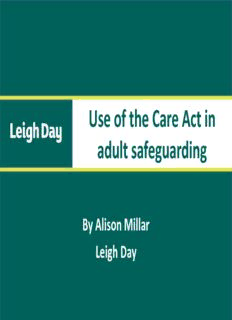
Alison Millar Care Act Seminar Presentation Oct 2015 PDF
Preview Alison Millar Care Act Seminar Presentation Oct 2015
Use of the Care Act in adult safeguarding By Alison Millar Leigh Day Development of Adult Safeguarding • Safeguarding adults relatively new concept. • Protection and support was found in various sources: general health and social care legislation and guidance, Mental Health Act, Mental Capacity Act, injunctions / civil orders and criminal law, Human Rights Act. • No Secrets: Guidance on Developing and Implementing Multi-Agency Policies and Procedures to Protect Vulnerable Adults from Abuse (DOH, March 2000), issued under s7 LASSA 1970. Criticisms of pre Care Act 2014 Regime • Criticisms of ‘No Secrets’ include outdated terminology; safeguarding processes that did not empower or listen to service users; lack of underpinning legislative framework; lack of engagement of other agencies e.g. the NHS, police. • Law Commission 2011 review of adult social care criticised legal framework for adult safeguarding: “neither systematic nor co-ordinated, reflecting the sporadic development of safeguarding policy over the last 25 years.” High profile cases of adult safeguarding failures Fiona Pilkington / Francecca Steven Hoskin (2006) Hardwick (2007) Key features of Care Act 2014 in relation to safeguarding • Care Act replaces ‘No secrets’ guidance. • New free-standing statutory duty on LAs to make safeguarding enquiries, regardless of whether individual is eligible for support. • Safeguarding Adults Boards (SABs) put on statutory footing. • Provision for independent advocacy support and representation in the safeguarding process. • Safeguarding duties have legal effect in relation to organisations other than the LA e.g. the NHS, police. Duty of co-operation. Prevention of abuse and neglect integral to adult social services statutory functions • Care Act establishes a new well-being principle which it is the general duty of a LA to promote: s1(1). • ‘Well-being’ encompasses wide range of factors listed in s1(2) including personal dignity, physical and mental health, protection from abuse and neglect, and control over day to day life. Applies to adult service users and carers. • Assessment and delivery of care and support must include consideration of well-being. • In exercising its care and support functions under the Act, a LA must have regard to, “…the need to protect people from abuse and neglect”: s 1(3)(g). Multi-agency safeguarding • General duty on LA to co-operate with relevant partners in the exercise of functions under the Care Act: s6(1). • Relevant partners include other LAs; NHS bodies; DWP; the police; prisons and probation services. • Duty to co-operate with other persons and bodies “as appropriate”. • Aims of co-operation include protecting adults with needs for care and support who are experiencing, or are at risk of, abuse or neglect, and identifying lessons to be learned from cases where adults with needs for care and support have experienced serious abuse or neglect and applying those lessons to future cases. • LA must make arrangements for ensuring internal co-operation between Social Services, Housing, Children’s Services and public health. • In specific individual cases, LAs and their partners may request co-operation in performing their respective functions relating to care and support and carers and must co-operate wherever they can: s7. Safeguarding in general LA responsibilities • LA duty to provide information and advice relating to care and support and support for carers includes what to do in cases of abuse and neglect: s4(2)(e). • Persons at risk of abuse or neglect could be eligible for support if their only need is for information, advice and advocacy: s8(1)(e). • Needs assessment must include an assessment of the impact of the adult’s needs for care and support in respect of s1(2) matters including protection from abuse and neglect: s9. • Carer’s assessment must also include an assessment of the impact of the carer’s needs for support on s1(2) matters: s10. • Refusal of assessment s11: LA must still carry out a needs assessment if the adult is experiencing, or is at risk of, abuse or neglect. Safeguarding enquiries • Duty on LA to make or cause to be made adult safeguarding enquiries: s42. • S42(1): Triggered when LA has reasonable cause to suspect that an adult in its area (whether or not ordinarily resident there) – a. has needs for care and support (whether or not the authority is meeting any of those needs). b. is experiencing, or is at risk of, abuse or neglect, and c. as a result of those needs is unable to protect himself or herself against the abuse or neglect or the risk of it. S42 enquiries cont. • Guidance makes clear enquiry could range from a conversation with the adult (or their representative or advocate) through to a much more formal multi-agency plan. • Purpose of the enquiry is to decide whether or not the LA or another organisation or person should do something to help and protect the adult. • Performance of enquiry can be delegated but enquiry should not be undertaken by service provider where serious conflict of interest, pattern of concerns or the matter requires investigation by the police. • LA should involve the police at an early stage if a crime is suspected; the criminal investigation will take priority although the LA will need to take steps to safeguard and support the adult. • S42 includes a definition of financial abuse but does not prioritise it above other forms of abuse or neglect.
Description: